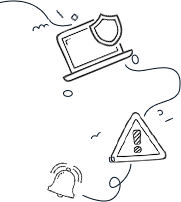Introduction
We all love a good scam story, right? But let’s flip the script: what if you’re the unwitting hero who falls into a trap that’s been laid out by a phishing villain? Spoiler alert: it’s not as exciting as it sounds.
Sometimes, these dastardly scammers conjure up fake websites that look as real as your grandma’s apple pie. Their endgame varies—some may want your login info to a legitimate site, while others might try to convince you to part with your hard-earned cash or give them your personal health data (yikes!). So, how can you protect your online kingdom? Here are three classic ways scammers lure you into their web of deceit and how to stay one step ahead!
Misspelled URLs
Ah, “fat fingers”—the universal excuse for sending a text meant for your buddy to your boss instead. Scammers leverage this all the time, hoping you type Goggle.com instead of Google.com. Honestly, who wouldn’t want to check out a website for a non-existent search engine?
Some misspellings are so blatant they’re laughable. Here are a few delightful examples:
- Goggle.com instead of Google.com
- Microsofte.com instead of Microsoft.com
- Help-me-Verizon.com instead of Verizon.com
But beware: sometimes the misspellings are so sneaky they’d give a chameleon a run for its money! For example, Amαzon cleverly substitutes a Greek letter for our good ol’ a, making it almost impossible to detect at first glance. And the same goes for a website posing as Instagram but calling itself 1nstagram.com—because nothing screams ‘trust me’ like a random number!
So remember to take a good look at that URL before you click—it might just save you from a electronic adventure you didn’t sign up for!
Deceptive QR Codes
Ever since QR codes became the cool kid on the block during the pandemic, they’ve been popping up everywhere—like those oddly specific ads that seem to follow you. Unfortunately, their infamous reputation has also made them a tool for scams, with the clever branding of quishing scams.
One moment you’re scanning a QR code to flip through a digital menu, and the next, you’re on a rollercoaster ride to a malicious site where hackers can steal your confidential information faster than you can say “selfie!” Always remember, those appealing QR codes can redirect you to sites that’d make a horror movie villain proud. So scan wisely, my friends!
Fake Search Results
When you’re on the hunt for information, don’t just dive into the first search result that pops up like it’s Black Friday. Scammers want you to think that every link on the first page is legitimate. But let’s face it: it’s the internet; not everything is as it seems.
Waltzing onto a phisher’s website can end with your data going on an unexpected trip to the Dark Web—like a vacation you never wanted! Make sure you look for these red flags when surfing the web:
- The URL starts with HTTP:// instead of HTTPS:// (nope, that “s” stands for secure, buddy!)
- A minor typo in the address—like calling your best friend by their ex’s name.
- No padlock icon next to the URL (and no, that doesn’t mean it’s your birthday!).
- Unprofessional language on the page—if it looks like it was written by your cousin in high school, run!
- Webforms asking for way too much information (seriously, why do they need your grandma’s maiden name and your dog’s birth certificate?).
If you sense something’s off, trust your gut! And remember, it’s perfectly fine to take a step back and reassess.
Conclusion
Don’t get tricked by the digital age’s tomfoolery! Stay vigilant and recognize those red flags that scream “fake website” louder than your alarm clock on a Monday morning.
Keep those bookmarks handy to avoid accidentally surfing into a similarly-named trap. Always look for that comforting padlock icon before typing away. And if you’re on your mobile phone, double-check that URL like your life depends on it—because in a way, it does!
In the world of online deception, scammers have a knack for reverse social engineering: they don’t even need to contact you directly to set their traps. So before you set out on your online escapades, be aware of the landscape and protect your devices from those digital imposters!
The post Are Fake Websites Faking You Out? appeared first on Cybersafe.




